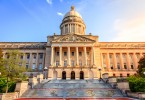With the final results from Super Tuesday primary voting now edged in the history books, it is fast becoming clear that this year’s Presidential election will be a battle to the finish line between Democratic front-runner Hillary Clinton and Republican front-runner Donald Trump. Should that prove to be true, it is likely going to be a reality check for LGBT equality with many of our hard-won gains on the line.
While initially appearing to be an all-inclusive candidate, Donald Trump, in recent weeks, has recanted much of his support for LGBT equality. In what was something of a shocking U-turn in regard to same-sex marriage, Trump is said to be now reconsidering the subject.
Last summer, Trump issued a blanket statement on the subject of same-sex marriage saying, “Some people have hopes of passing amendments, but it’s not going to happen… Anybody that’s making that an issue is doing it for political reasons. The Supreme Court ruled on it.”
A few weeks ago on Fox News, however, Trump seemed to be picking up on a plan extolled by Marco Rubio, who had earlier pledged to appoint ultra conservative judges to the Supreme Court and demand a relook at the issue.
On Fox News, Trump said the following regarding same-sex marriage: “It has been ruled upon, it has been there. But if I’m elected I would be very strong in putting certain judges on the bench that maybe could change things.
“At some point they have to get back down to business, but there’s no question about it, I wish it was done by the state.”
Speaking to David Brody of the Christian Broadcasting Network in mid-February, Trump said that he could be “trusted” to overturn the ruling.
It was an interesting side-step by the ever-elastic contender who had been pegged by Log Cabin Republicans as “one of the best, if not the best, pro-gay Republican candidates to ever run for the presidency.”
The endorse was a surprise for Trump who responded, “I have not heard that at all… I think evangelicals can trust me on traditional marriage.
“Frankly it should have been state – I was very much in favor of having the court rule that it goes to states, and let the states decide.
“It was a shocking decision for you and for me and for a lot of people. I was in favor of letting the states decide and that’s the way it looked like it was going, and then all of a sudden out of nowhere came this very massive decision and they took it away.
“I was always in favor of states rights, states deciding – on many issues, not just this.”
Following yesterday’s results, the Human Rights Campaign has warned that LGBT rights will be to play for in a eventual showdown between the two.
HRC President Chad Griffin said: “In the biggest showdown of the campaign so far, the strong showing from both Hillary Clinton and Donald Trump foreshadows the stakes for millions of LGBT Americans in November.
“As pro-equality voters look toward Election Day, the differences between Hillary Clinton and Donald Trump on LGBT equality are enormous.
“Hillary Clinton has presented a clear vision for creating a better future for LGBT people across this nation.
“Donald Trump has demonstrated that he would block full LGBT equality as president, whether it’s by appointing Supreme Court justices to overturn nationwide marriage equality or by supporting legislation that would lead to more Kim Davis-like discrimination.”
The Human Rights Campaign has officially endorsed Hillary, and its members and supporters have made thousands of GOTV calls into Super Tuesday states in the last week. Prior to that, HRC opened offices and sent staff to South Carolina, Nevada, New Hampshire and Iowa where it made thousands of voter contacts in the states on behalf of Hillary Clinton.
With 1.5 million members and supporters nationwide, HRC is planning an unprecedented organizational effort to register and mobilize the nation’s pro-equality majority, and elect pro-LGBT candidates up and down the ballot. In 2016, HRC expects that the pro-equality vote will be larger, stronger, and more energized than at any point in history.
According to Brandon Lorenz at the HRC, exit polls show that in 2012 at least six million LGB Americans voted in an election decided by less than five million votes. Today, in key states like Ohio, North Carolina, and Florida, the population of LGBT adults is greater than the average margin of victory in the last three presidential elections.
Polling done by Greenberg Quinlan Rosner for HRC shows that a 55% majority of voters are less likely to support a candidate for president who opposes allowing same-sex couples to marry. This majority includes Independents, married women and white millennials. All of these groups voted Republican in the last congressional election.
Clinton’s competitor Bernie Sanders, has not released specific policies on LGBT issues with the exception of a few broad policy points. He claims the wave of endorsements for Clinton were “establishment groups rallying aroun the establishment candidate, reminding everyone that he supported equal marriage four years before Clinton.







